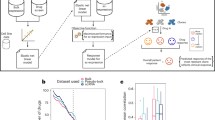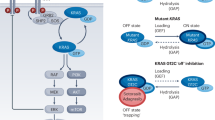Abstract
Loss-of-function alterations of Neurofibromin 1 (NF1) activate RAS, a driver of colorectal cancer. However, the clinical implications of NF1 alterations are largely unknown. We performed a comprehensive molecular profiling of NF1-mutant colorectal cancer using data from 8150 patients included in a dataset of commercial CLIA-certified laboratory (Caris Life Sciences). In addition, NF1 expression levels were tested for associations with clinical outcomes using data from 431 patients in the CALGB/SWOG 80405 trial. In the Caris dataset, 2.2% of patients had pathogenic or presumed pathogenic NF1 mutations. NF1-mutant tumors more frequently harbored PIK3CA (25.0% vs. 16.7%) and PTEN mutations (24.0% vs. 4.2%) than wild type tumors. Gene set enrichment analysis revealed that MAPK and PI3K pathway signatures were enriched in NF1-mutant tumors. In the CALGB/SWOG 80405 cohort, low NF1 expression was associated with poor prognosis, and high NF1 expression was associated with better efficacy of cetuximab than bevacizumab. Together, we revealed concurrent genetic alterations in the PI3K pathways in NF1-mutant tumors, suggesting the need to simultaneously block MAPK and PI3K pathways in treatment. The potential of NF1 alteration as a novel biomarker for targeted therapy was highlighted, warranting further investigations in clinical settings.
This is a preview of subscription content, access via your institution
Access options
Subscribe to this journal
Receive 50 print issues and online access
$259.00 per year
only $5.18 per issue
Buy this article
- Purchase on Springer Link
- Instant access to full article PDF
Prices may be subject to local taxes which are calculated during checkout





Similar content being viewed by others
References
Markowitz SD, Bertagnolli MM. Molecular origins of cancer: molecular basis of colorectal cancer. N Engl J Med. 2009;361:2449–60.
Moore AR, Rosenberg SC, McCormick F, Malek S. RAS-targeted therapies: is the undruggable drugged? Nat Rev Drug Discov. 2020;19:533–52.
Van Cutsem E, Cervantes A, Adam R, Sobrero A, Van Krieken JH, Aderka D, et al. ESMO consensus guidelines for the management of patients with metastatic colorectal cancer. Ann Oncol. 2016;27:1386–422.
Sepulveda AR, Hamilton SR, Allegra CJ, Grody W, Cushman-Vokoun AM, Funkhouser WK, et al. Molecular biomarkers for the evaluation of colorectal cancer: guideline from the American Society for Clinical Pathology, College of American Pathologists, Association for Molecular Pathology, and the American Society of Clinical Oncology. J Clin Oncol. 2017;35:1453–86.
Price TJ, Peeters M, Kim TW, Li J, Cascinu S, Ruff P, et al. Panitumumab versus cetuximab in patients with chemotherapy-refractory wild-type KRAS exon 2 metastatic colorectal cancer (ASPECCT): a randomised, multicentre, open-label, non-inferiority phase 3 study. Lancet Oncol. 2014;15:569–79.
Bertotti A, Papp E, Jones S, Adleff V, Anagnostou V, Lupo B, et al. The genomic landscape of response to EGFR blockade in colorectal cancer. Nature. 2015;526:263–7.
Woolston A, Khan K, Spain G, Barber LJ, Griffiths B, Gonzalez-Exposito R, et al. Genomic and transcriptomic determinants of therapy resistance and immune landscape evolution during anti-EGFR treatment in colorectal cancer. Cancer Cell. 2019;36:35–50.e39.
Diez D, Sanchez-Jimenez F, Ranea JA. Evolutionary expansion of the Ras switch regulatory module in eukaryotes. Nucleic Acids Res. 2011;39:5526–37.
Rad E, Tee AR. Neurofibromatosis type 1: Fundamental insights into cell signalling and cancer. Semin Cell Dev Biol. 2016;52:39–46.
Post JB, Hami N, Mertens AEE, Elfrink S, Bos JL, Snippert HJG. CRISPR-induced RASGAP deficiencies in colorectal cancer organoids reveal that only loss of NF1 promotes resistance to EGFR inhibition. Oncotarget. 2019;10:1440–57.
Georgiou A, Stewart A, Cunningham D, Banerji U, Whittaker SR. Inactivation of NF1 promotes resistance to EGFR inhibition in KRAS/NRAS/BRAF(V600) -Wild-Type Colorectal Cancer. Mol Cancer Res MCR. 2020;18:835–46.
Venook AP, Niedzwiecki D, Lenz HJ, Innocenti F, Fruth B, Meyerhardt JA, et al. Effect of first-line chemotherapy combined with cetuximab or bevacizumab on overall survival in patients with KRAS wild-type advanced or metastatic colorectal cancer: a randomized clinical trial. JAMA. 2017;317:2392–401.
Vanderwalde A, Spetzler D, Xiao N, Gatalica Z, Marshall J. Microsatellite instability status determined by next-generation sequencing and compared with PD-L1 and tumor mutational burden in 11,348 patients. Cancer Med. 2018;7:746–56.
Magnuson AM, Kiner E, Ergun A, Park JS, Asinovski N, Ortiz-Lopez A, et al. Identification and validation of a tumor-infiltrating Treg transcriptional signature conserved across species and tumor types. Proc Natl Acad Sci USA. 2018;115:E10672–E10681.
Wagle MC, Kirouac D, Klijn C, Liu B, Mahajan S, Junttila M, et al. A transcriptional MAPK Pathway Activity Score (MPAS) is a clinically relevant biomarker in multiple cancer types. NPJ Precis Oncol. 2018;2:7.
Campbell BB, Light N, Fabrizio D, Zatzman M, Fuligni F, de Borja R, et al. Comprehensive analysis of hypermutation in human cancer. Cell. 2017;171:1042–56.e1010.
Mauri G, Arena S, Siena S, Bardelli A, Sartore-Bianchi A. The DNA damage response pathway as a land of therapeutic opportunities for colorectal cancer. Ann Oncol. 2020;31:1135–47.
Riaz N, Blecua P, Lim RS, Shen R, Higginson DS, Weinhold N, et al. Pan-cancer analysis of bi-allelic alterations in homologous recombination DNA repair genes. Nat Commun. 2017;8:857.
de Bruin EC, Cowell C, Warne PH, Jiang M, Saunders RE, Melnick MA, et al. Reduced NF1 expression confers resistance to EGFR inhibition in lung cancer. Cancer Discov. 2014;4:606–19.
Maertens O, Cichowski K. Paths of resistance to EGFR inhibitors: is NF enough? Cancer Discov. 2014;4:519–21.
Akbay EA, Koyama S, Carretero J, Altabef A, Tchaicha JH, Christensen CL, et al. Activation of the PD-1 pathway contributes to immune escape in EGFR-driven lung tumors. Cancer Discov. 2013;3:1355–63.
Kumagai S, Koyama S, Nishikawa H. Antitumour immunity regulated by aberrant ERBB family signalling. Nat Rev Cancer. 2021;21:181–97.
Loi S, Dushyanthen S, Beavis PA, Salgado R, Denkert C, Savas P, et al. RAS/MAPK activation is associated with reduced tumor-infiltrating lymphocytes in triple-negative breast cancer: therapeutic cooperation between MEK and PD-1/PD-L1 immune checkpoint inhibitors. Clin Cancer Res. 2016;22:1499–509.
Arai H, Elliott A, Xiu J, Wang J, Battaglin F, Kawanishi N, et al. The landscape of alterations in DNA damage response pathways in colorectal cancer. Clin Cancer Res. 2021;27:3234–42.
Vidotto T, Melo CM, Castelli E, Koti M, Dos Reis RB, Squire JA. Emerging role of PTEN loss in evasion of the immune response to tumours. Br J Cancer. 2020;122:1732–43.
Acknowledgements
We thank all patients who contributed to this study. Research reported in this publication was supported by the National Cancer Institute of the National Institutes of Health under Award Numbers U10CA180821 and U10CA180882 (to the Alliance for Clinical Trials in Oncology), UG1CA233163, P30CA 014089 [to H-JL], Gloria Borges WunderGlo Foundation, Dhont Family Foundation, Victoria and Philip Wilson Research Fund, San Pedro Peninsula Cancer Guild, and Daniel Butler Research Fund. Also supported in part by funds from Bristol-Myers Squibb, Genentech, and Pfizer. The content is solely the responsibility of the authors and does not necessarily represent the official views of the National Institutes of Health.
Author information
Authors and Affiliations
Contributions
HA and HJL planned, designed, and administered this study. The original draft was written by HA, AE, and HJL. AE, JM, and JZ were responsible for the statistical analysis. JX, FSO and FI contributed to administrative, technical, or material support. JX, JW, FB, PJ, NK, SS, WZ, DS, RMG, MJH, AJS, MK, JJH, EL, BAW, ACL, AFS, JPA, DM, PS, made substantial contributions to data resource, investigations, and manuscript review and editing. APV, WMK, and HJL supervised this study. All authors read and approved the final manuscript.
Corresponding author
Ethics declarations
Competing interests
DS reports consulting role for Ability Pharmaceuticals, honoraria from Foundation Medicine, Speakers bureau from Incyte, and research funding at institution from Amgen, Apexigen, Bristol-Myers Squibb, Celgene, FibroGen, Genentech, Medimmune, Merck, OncoMed, and Rafael. RMG reports consulting/advisory role for Merck, Taiho Pharmaceutical, Merck KGaA and Novartis, research funding from Bristol-Myers Squibb, and travel paid from Merck KGaA and Merck. WMK reports consulting role for Merck. HJL reports a role of advisory board for Merck KG, Merck, Bayer, Roche/Genentech, G1 Therapeutics, Oncocyte, Fulgent, Jazz Therapeutics, and Bicara. AE, JX, JPA, DM, PS, JZ, and WMK are Caris employee. All remaining authors declare no competing interests.
Additional information
Publisher’s note Springer Nature remains neutral with regard to jurisdictional claims in published maps and institutional affiliations.
Supplementary information
Rights and permissions
About this article
Cite this article
Arai, H., Elliott, A., Millstein, J. et al. Molecular characteristics and clinical outcomes of patients with Neurofibromin 1-altered metastatic colorectal cancer. Oncogene 41, 260–267 (2022). https://doi.org/10.1038/s41388-021-02074-z
Received:
Revised:
Accepted:
Published:
Issue Date:
DOI: https://doi.org/10.1038/s41388-021-02074-z



